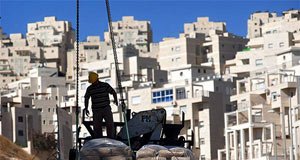Construction on new homes in illegal Israeli settlements in the occupied West Bank has jumped by 70 percent in the first half of this year, the Israeli NGO Peace Now reported.
The group said on Thursday that 1,708 new homes were started between January and June, compared with 995 in the same period last year.
Israeli media reported in May that Prime Minister Benjamin Netanyahu had ordered a freeze on new tenders for settler homes. But most of the new construction is taking place in areas where tenders are not required, circumventing the freeze.
The findings will further undermine negotiations between Israel and the Palestinian Authority, which resumed under US pressure in July.
SaebErekat, the Palestenian chief negotiator, told the AFP news agency that settlement growth was “destroying the peace process” and that Israel was “fully responsible for this situation and its outcome.”
“Fortunately the Palestinians did not leave the talks because of the continued construction in settlements, but there is a chance that if this policy continues, then it will be very, very hard to hold on to the talks,” said HagitOfran, the director of Peace Now’s settlement project.
Troubled talks
The group said that 61 percent of the new construction was in isolated settlements, outside the larger “blocs” which Israel expects to keep in any deal with the Palestinians.
About 500,000 Israelis now live in the occupied West Bank, a number that has tripled in the two decades since the Oslo Accords were signed.
Israeli and Palestinian negoatiators have released few details of their talks, but media reports suggest their meeings are increasingly tense.
The Israeli newspaper Ma’ariv reported on Thursday that negotiations almost collapsed last month over the issue of borders, particularly Israel’s demand to keep a long-term military presence in the Jordan Valley.
Israeli negotiators proposed leasing the valley “for decades” from the Palestinians, which PA President Mahmoud Abbas’s spokesman Nabil Abu Rdeinah called unacceptable.
“We shall not accept any Israeli military presence, not even that of a single soldier, on the soil of the Palestinian state,” he told AFP.–Agencies

